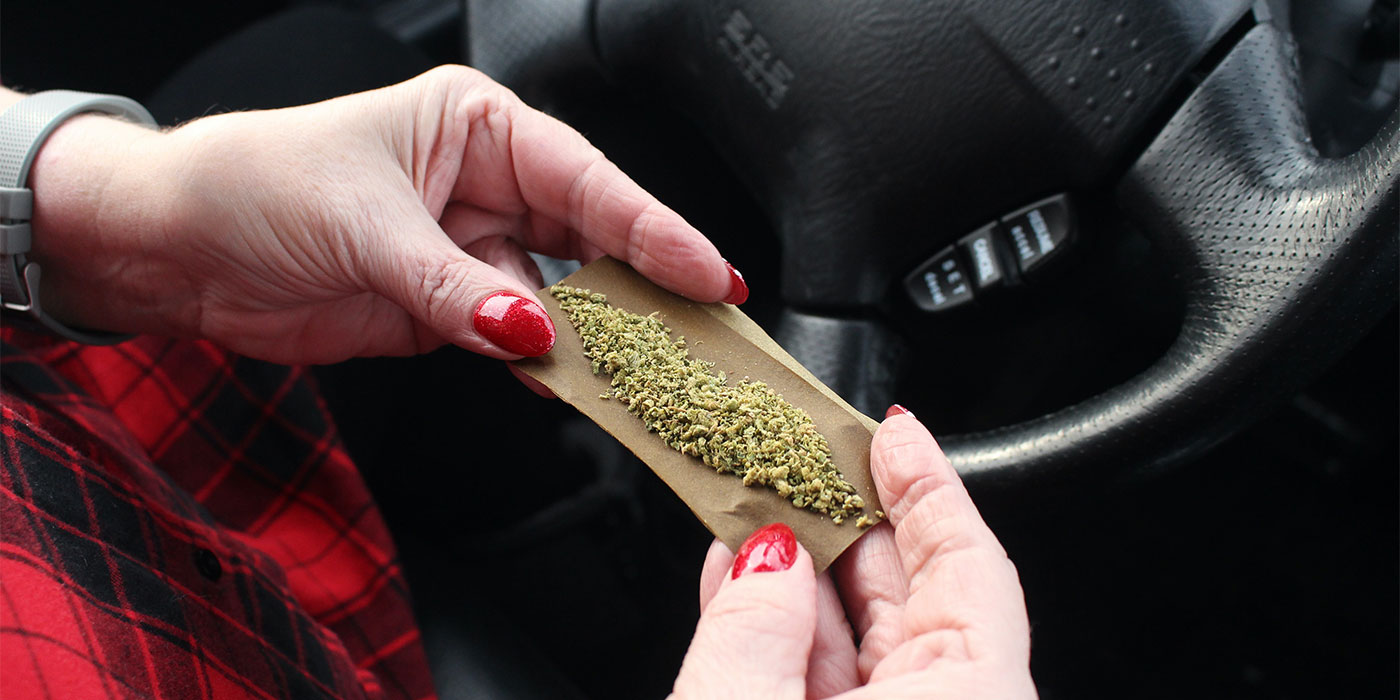
Any tire dealer knows it’s a challenge to find great employees. Further adding to the headache of a shrinking qualified workforce is the issue of drug use. Four out of five employers have had to deal with drug abuse in the workplace, costing U.S. businesses an estimated $26 billion in lost productivity, healthcare expenses and theft each year.
As states legalize marijuana use and heroin addiction reaches epidemic levels, shops are pressed to balance a shrinking supply of employees and technicians with an increase in illegal – and legal – drug use.
While there are many drugs to consider, we will focus largely on heroin and marijuana as examples, since they are becoming an increasingly prevalent issue for employers. As more states legalize medical/recreational marijuana use, employers will have to take additional steps to protect themselves from legal ramifications. Assume that other drugs can be treated similarly when it comes to creating a drug policy.
The Effects of Drugs in the Workplace
When employees are using drugs, whatever the drug being used, safety in the workplace can be seriously compromised. At best, an employee who is under the influence cannot perform the functions of his or her job to the fullest extent. In the very least, this could mean tardiness or apathy. However, on the other end of the spectrum – particularly in the case of a tire dealership’s technicians, courtesy car drivers, etc. – this could result in serious harm or injury to themselves, to other employees or to customers. Their drug use might also cause them to take surprising actions.
You may think your trusted employees would never clock in with drugs in their systems, but addiction can be more powerful than employer loyalty, says Bill Cleary, director of human resources for Dunn Tire, which operates 29 locations throughout New York and Pennsylvania.
“Over the last 20 years (since I’ve been with Dunn Tire), we have had a few issues with marijuana, cocaine and heroin, some of which have included catching employees stealing tires or money to support their addiction,” Cleary says. “We were losing tires from one of our stores and we started looking into it. An investigation with the help of the local police found an employee who was stealing the tires because he was using the money to buy heroin. This was a nice kid; he was a good employee and it was really sad to see that it had such a hold on him. He had no remorse for stealing to support that habit.”
Heroin use is soaring. According to the Centers for Disease Control and Prevention, its use has increased across the U.S. among men and women, most age groups and at all income levels. Some of the greatest increases occurred in demographic groups with historically low rates of heroin use – such as women, the privately insured, and people with higher incomes. The CDC also states that heroin use has more than doubled among young adults ages 18-25 in the past decade; more than 9 in 10 people who used heroin also used at least one other drug; and 45% of people who used heroin were also addicted to prescription opioid painkillers. (See the infographic on page 35 for more startling statistics.)
Though legal in some states, marijuana use is also on the rise, as is its drain on businesses. Though many incorrectly assume marijuana is not as harmful or addictive, it is indeed a threat to the workplace according to Tommy Eden III, an Alabama-based partner at the nationwide management labor law firm Constangy, Brooks, Smith & Prophete LLP, which has more than 180 attorneys across 30 offices in 15 states.
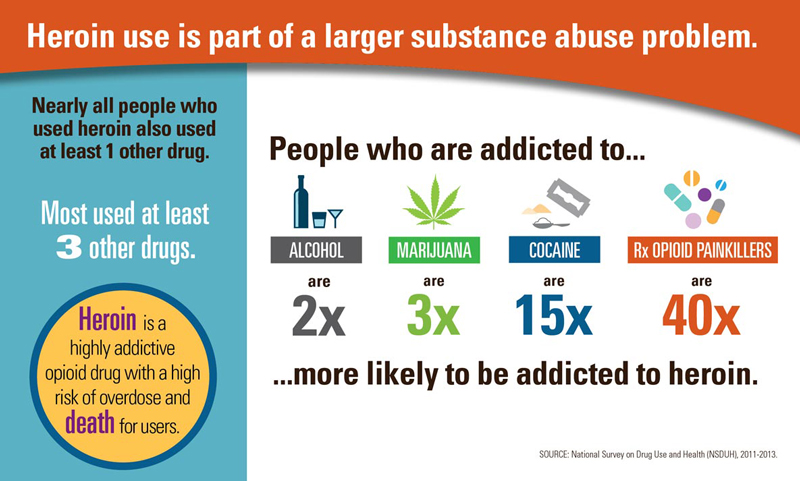
Citing a 2015 whitepaper titled, “What Will Legal Marijuana Cost Employers?” by National Families in Action, a drug policy and education organization, Eden – who heads up his firm’s Workplace Drug & Alcohol Testing Group – says that employees who test positive for marijuana have 55% more industrial accidents, 85% more injuries and a 75% higher absenteeism rate.
Similarly, employees who use drugs are more likely to ask for early dismissal or time off, to be absent, to be late for work, to be involved in workplace accidents, and to file worker’s compensation claims, Eden says, citing “Workplace Drug Testing in the Era of Legal Marijuana,” a 2015 whitepaper by the Institute for Behavior and Health, a non-profit organization that develops strategies to reduce drug use. That whitepaper also states that marijuana users can suffer from such workplace threats as impaired short-term memory, impaired motor coordination and altered judgment.
Set the Foundation by Creating a Policy
Protecting your business from the dangers of drugs – both from a safety standpoint and from a legal perspective – begins with the employee handbook, a drug-free workplace policy and specific pre-employment actions.
If your shop does not already have a drug policy in the employee handbook, it’s time to contact your attorney to get one in writing. A uniform and clearly defined drug-free policy is also one way to protect your customers, your employees and your business.
“All impairing-effect drugs and substances pose a safety and competitive threat to the workplace, and [employers should] treat all impairing-effect medications equally to avoid a discrimination/not-compassionate claim,” Eden explains.
This means adopting consistent safety rule language and procedures across the board for all employees, he adds.
“Being able to work in a constant state of alertness and safe manner should be an essential function included in all safety sensitive job descriptions, handbooks, drug testing policies and safety rules,” notes Eden. “This language protects against marijuana, opiates, meth, cocaine, etc. – with none of those are you going to be able to work in a state of alertness and safe manner.”
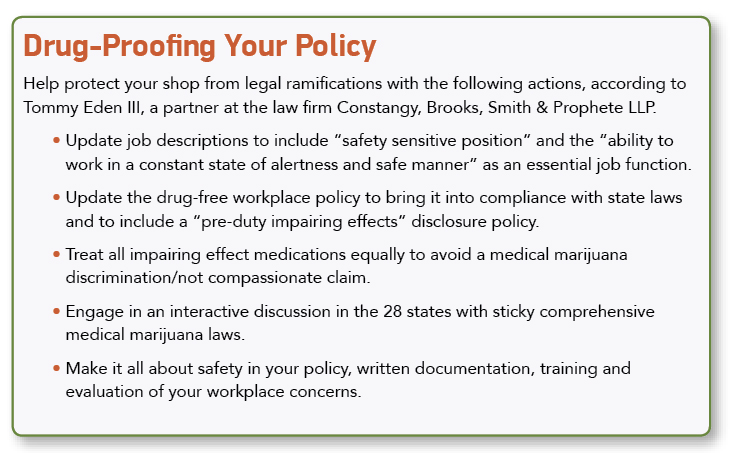
It is critical to use the phrase “constant state of alertness” as an essential job function, rather than say an employee may not come to work “impaired” or “under the influence” of drugs, stresses Eden. This is because there is no standard gauge for determining how much of any particular drug in a person’s system equals impairment (as opposed to blood alcohol volume, for example), and can subject an employer to a legal battle.
“Impairment is a legal stand adopted by a state for drivers on its roads and requires a toxicologist, a medical review officer and a legal determination at the end of the day,” Eden explains. “You don’t want to have to go there.”
When it comes to drug testing current employees and potential new hires, again, consistency is key to avoid discrimination claims and legal issues.
Cleary says Dunn Tire has a “zero tolerance” policy. “If an employee tests positive, that is grounds for immediate termination. We do pre-employment, quarterly random, post accident and just cause drug testing.”
Bud’s Tire and Wheel, with three locations in Southern California, requires all candidates to undergo a pre-employment drug screening before an offer of employment is extended, according to Nicole Luppino, operations manager.
“Since we realize that this can’t prevent employees from using drugs once they are hired, we have instituted a reasonable suspicion policy which allows us to send an employee for a drug test should we have a reasonable suspicion that they are under the influence while working,” she says. “Should an employee test positive, we may look into options of assisting the employee into a substance abuse program in place of employment termination. If this were the case, a ‘return to duty’ drug test would have to be taken and passed before the employee could return to work.”
See page 36 for more details about these shops’ specific drug policies.
Navigating the Maze of ‘Legal’ Marijuana
Preventing the effects of drugs in the workplace used to be relatively clear-cut – that is, until state legislation allowing medical and/or recreational marijuana use entered the picture.
“Medical marijuana has created significant employer concern and confusion about marijuana testing, specifically,” says Eden, adding that every state’s marijuana laws are different and that technically, the use of marijuana – as a Schedule I drug – is still prohibited under federal law.
“Many employers do not appreciate the hodgepodge of state laws that impact drug-free workplace programs,” he continues. “No two states’ drug testing laws are the same and our firm drafts policies in all 50 states and all DOT modes. So having a policy drafted to fit both your company’s drug testing philosophy and the laws of the particular states where employees report for duty is critical. Having a one-size-fits-all policy may be easier to draft, but harder to defend.”
The first medical marijuana initiative took place in California in 1996; as of the November 2016 election, 28 states and Washington, D.C. have comprehensive medical marijuana laws, Eden notes.
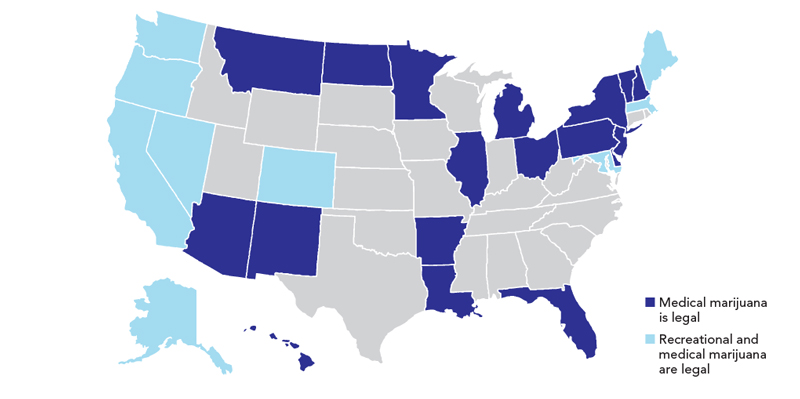
If your shop operates locations in the following states, extra caution is required when creating and enforcing a workplace drug policy.
• States where recreational and medical marijuana use is legal: Alaska, California, Colorado, Massachusetts, Maine, Nevada, Oregon and Washington.
• States where medical marijuana use is legal: Arizona, Arkansas, Connecticut, Delaware, Illinois, Florida, Louisiana, Maryland, Michigan, Minnesota, Montana, New Jersey, New Hampshire, New Mexico, New York, North Dakota, Ohio, Pennsylvania, Rhode Island and Vermont.
Eden notes that within those states, there are a handful that are particularly “tricky” for employers, as there are state laws that offer protection for employees who hold a medical marijuana card: Arizona, Connecticut, Delaware, Illinois, Maine, Minnesota, Nevada, New York, Pennsylvania and Rhode Island.
For example, Arizona offers explicit employee protection by prohibiting employment discrimination based on a person’s status as a registered medical marijuana user and/or a registered user who fails a drug test. Regarding recreational marijuana use, Maine law states that an employer may not refuse to employ or otherwise penalize a person 21 years of age or older solely for that person’s consuming marijuana outside of the employer’s property.
When it comes to medical marijuana, employers in these 28 states should update their safety policies to require that current and potential employees provide “pre-duty disclosure of impairing effect prescription medications and substances as a safety rule,” says Eden. “(This) allows you to stand firm by treating all impairing effect medications equally to avoid a discrimination/not compassionate claim; there is no discrimination against medical marijuana cardholders – just a rule to keep your workplace safe.”
In fact, employers in all states may want to consider adding this language, since there are multiple opioid-based prescription medications that are just as impairing as marijuana and present safety risks in the workplace, he adds.
“Having pre-duty impairing effects prescription medication disclosure policy as a safety rule in your drug-free workplace program is the best strategy I know of to avoid clashing with medical marijuana statutes, while still maintaining a safe workplace,” according to Eden. “Utilizing OSHA’s Section 5 employer obligation to provide a safe place to work from known hazards can be a defensive legal shield if used correctly.”
If an employee is a medical marijuana cardholder – a qualifying patient who has been diagnosed as having a debilitating medical condition – and he or she has NOT previously disclosed that fact and then subsequently fails a drug test, employers that have the above “pre-duty disclosure” safety policy in place should be able to discipline employees for a safety violation, according to Eden. However, he adds that discipline should be administered under the guidance of an attorney who is knowledgeable about the drug testing and employment laws of that state.
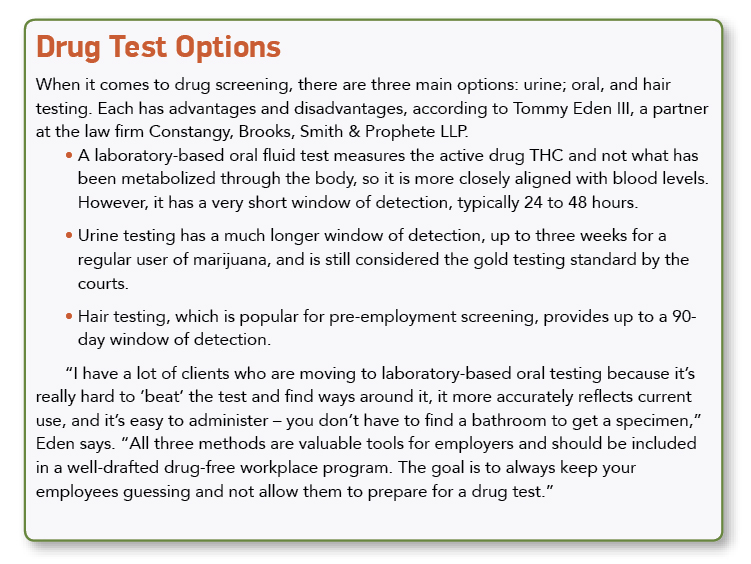
For an employee who has disclosed the fact that he or she is a medical marijuana cardholder, “having an interactive discussion with the employee before taking adverse employment action is a smart risk-reduction strategy,” he notes.
According to Eden, this conversation could include: addressing only the medical condition and affected work issue; the nature, extent, severity and duration of any impairment or leave, and asking for medical documentation about the employee’s functional limitations.
Examples of reasonable accommodations employers can make for an employee who is a cardholder include a leave of absence, a work continuation agreement or a modified work schedule, he explains.
One exception that is very relevant to tire dealers is that in the pre-duty prescription medication disclosure policy, language can be included to state something to the effect of, “We do not accommodate the use of recreational or medical marijuana by safety sensitive employees,” Eden says. Failure to include that language will most likely cause governmental agencies and courts to find that silence means a ruling in favor of the employee, since in most cases the burden of proof is on the employer, he adds.
“Safety sensitive positions are more easily defensible when faced with a medical marijuana cardholder,” he explains. “It is important that employers designate in job descriptions which positions are considered safety sensitive and make an essential function of each one of those positions ‘the ability to work in a constant state of alertness and safe manner.’”
Safety sensitive jobs include all positions in which “a momentary lapse of concentration would result in serious injury or death, or environmental consequences,” according to Eden.
“Employers can still stand firm against marijuana for all employees under the current state of the law for as long as marijuana remains a Schedule I illegal drug,” he adds. “It is only when dealing with a cardholder that employers should be cautious.”
For more information on tire dealer drug policies, click here to read how Dunn Tire and Bud’s Tire & Wheel handle drugs in the workplace.










